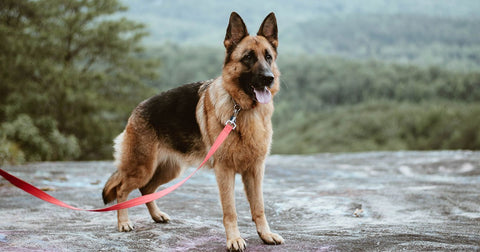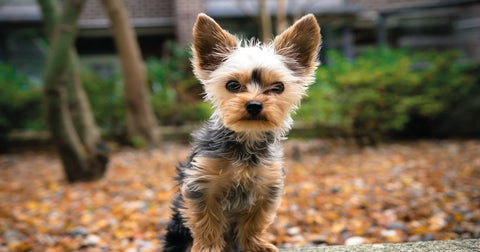Excellent service dogs and companions, the German Shepherd is an incredibly intelligent and loyal companion. They are one of the most popular dog breeds as they are gentle in nature but, with training, make excellent guard dogs and protectors.
The German Shepherd as we know it today was first introduced in Germany in 1899 as they were developed from old shepherd and farm dogs. It was during World War II that the word ‘German’ was dropped and people started referring to the breed as Alsatians.
Nowadays, German Shepherds serve great purposes, working as guide dogs for the blind and as police or military dogs.
Aside from making great service dogs, they can make a wonderful companion at home with the correct care and training.
SIZE
German Shepherds normally stand somewhere between 22 and 26 inches tall and weigh between 60 to 100 pounds with a life expectancy of 7-10 years.

COAT
With a coarse, medium-length double coat, their fur can become wiry so should be brushed every couple of days. They have quite a high shedding rate so make sure you’re prepared for some hairs on furniture and clothes. That hoover will definitely come in handy.
Keeping your German Shepherd well groomed will result in less shedding however as their coat resists dirt, they only need to be bathed around once a month. Any more than this will strip out their natural oils which keep their fur healthy and shiny.

GROOMING
German Shepherds have a powerful jaw that they need to keep chomping and chewing, especially when they are teething puppies. Make sure you provide them with plenty of durable toys and long lasting chews like our Veal Bone or treat them to our Super Chomper Box. Brush their teeth a couple of times a week to keep their dental hygiene up to scratch and keep their nails trimmed so they can walk around comfortably.
EXERCISE REQUIREMENTS
As German Shepherds are incredibly intelligent and athletic, they need a high level of exercise and training to ensure that they are kept in the best shape both physically and mentally.
If they are not properly trained or exercised, the dogs can become anxious or sometimes aggressive as they do not have a proper outlet for their energy. Ideally, German Shepherds should be trained to serve a purpose and their desire to train should make it an easy job.

When it comes to walks, one a day is not enough for German Shepherds. They need at least two hours of exercise so are great company on a jog as they need to run and play to let out all of their energy. Dogs who are not properly exercised are more likely to show bad behaviours such as chewing or barking so make sure that their brains and bodies are kept fully engaged and active throughout the day.
HEALTH ISSUES
As with any dog, German Shepherds are more likely to develop certain health conditions. Some of these include:
- Hip dysplasia
- Elbow dysplasia
- Elbow hygroma
- Gastric dilatation-volvulus
- Degenerative myelopathy

WOULD YOU SUIT A GERMAN SHEPHERD?
Thinking of getting a German Shepherd Puppy? Make sure the breed will fit comfortably into your lifestyle.
Alsatians will fit in well with more active households who enjoy spending time outdoors.
Socialisation is key as they must learn to be comfortable around new people and dogs. Dogs can become scared in new environments so be careful when introducing them to new people. Although they are friendly, loving dogs, they may not fit in well in households with several pets unless they are raised together. Meeting dogs they don’t know, especially those of the same sex, may cause problems so be sure to take care when visiting dog parks.
A house with a fenced off garden is ideal for German Shepherds over an apartment so that they have space to roam. More importantly, they should not be left for long periods of time (never any more than 4 hours) and should be given plenty of attention.
Check out some profiles on Cavapoos and Greyhounds.




Comments (0)
There are no comments for this article. Be the first one to leave a message!